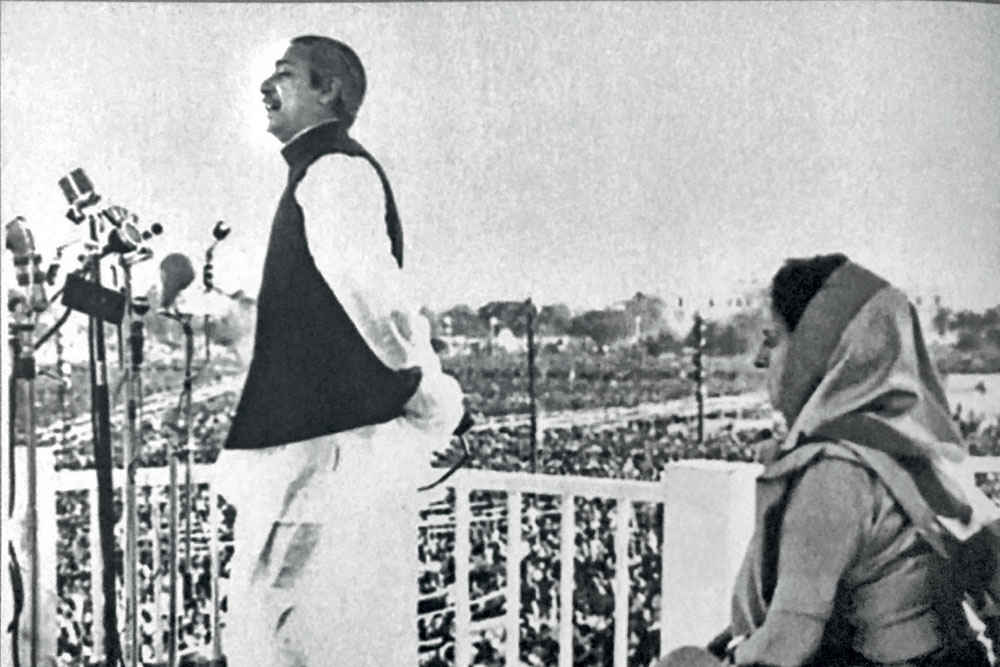February 23 is a red-letter day for the nation, in 1969, the people of Bangladesh bestowed the “Bangabandhu” title on Sheikh Mujibur Rahman; he later led the nation to gain independence through supreme sacrifices made during the Liberation War in 1971.
The then-Dhaka University Central Students’ Union (Ducsu) Vice President and Sarbadaliya Chhatra Sangram Parishad Convenor Tofail Ahmed announced the title on behalf of the people at a rally after Sheikh Mujib—subsequently the father of the nation—was freed from jail in the Agartala Conspiracy case on February 22, 1969.
“On the basis of the historic 11-Point Movement, we freed Bangabandhu from a Pakistani jail on February 22, through an uprising. As a mode of gratefulness, the Chhatra Sangram Parishad, on behalf of the nation, conferred the Bangabandhu title on Sheikh Mujibur Rahman on February 23,” Tofail, who was Ducsu VP for the 1968-69 term, told BSS in an interview.
Recalling the event, veteran Awami League leader Tofail said: “I chaired the function, as the Ducsu VP, and addressed it before Bangabandhu. I said we were conferring the Bangabandhu title on the leader who spent his youth in a Pakistani jail and wanted to embrace death on the stage of the gallows with a smiling face.”
Since then, the greatest Bangali of all time has been known by that title which, in Bangla, means the friend of the people.
Tofail, a seasoned politician and parliamentarian, said: “We had initiated the movement at the Dhaka University Kala Bhaban [Arts Faculty] on January 17,1969; where Asad, Matiur, Makbul Rustom, and Sergeant Zahurul Haque in cantonment—and Rajshahi University Proctor Prof Shamsuzzoha—embraced martyrdom, through which we were able to free Bangabandhu from jail.”
“Under the leadership of Bangabandhu, we won the 1970 general election and he then led the Liberation War to gain independence for the country in 1971,” he said.
The former minister said Bangabandhu had spent most of his youth, 13 years, in a Pakistani jail for the emancipation of the people.
“I felt proud saying that we could implement both of our two slogans; freeing Bangabandhu, and freeing our motherland, Bangladesh. On February 22, 1969, we freed our loving leader Bangabandhu—who subsequently became father of the nation—and on December 16, we liberated the country under the leadership of Bangabandhu” he said.
Bangabandhu, who had been arrested on May 8, 1966, was put on trial as the main accused in the Agartala Conspiracy case in 1968 which subsequently triggered the 1969 uprising.
On January 4, 1969, Tofail said, Sarbadaliya Chhatra Sangram Parishad was formed and comprised 10 student leaders.
The movement started on January 17 of the same year; and the parishad called a meeting on that day despite the police placing Section 144 during the autocratic rule of Ayub Khan, then-president of Pakistan.
Tofail said they had taken an oath to hold a public rally at Paltan on February 9, 1969. “We had taken oath saying we will free Bangabandhu and we will free our motherland Bangladesh,” he added.
On February 15 of the same year, Sergeant Zahrul Huq, a prisoner on trial in the Agartala Conspiracy case, was shot and killed in Dhaka Cantonment.
On February 21, the Parishad gave a 24-hour ultimatum to the then-Pakistan government to free Sheikh Mujib unconditionally. He was eventually released on February 22.
“Around a million people raised their hands, united at a grand public rally at Suhrawardy Udyan, on February 23, 1969, and conferred the title of Bangabandhu on Sheikh Mujibur Rahman,” Tofail said.

